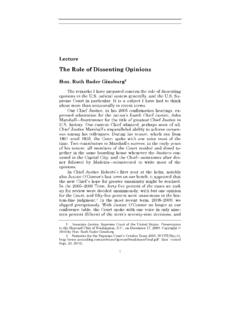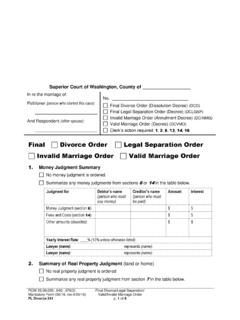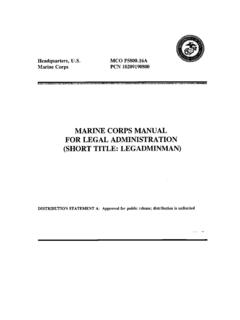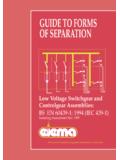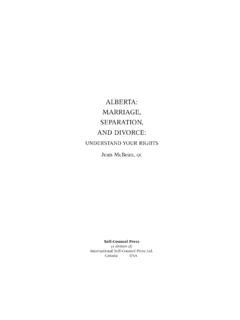Transcription of Separation of Powers During the Forty- Fourth Presidency ...
1 1454 Article Separation of Powers During the Forty- Fourth Presidency and beyond Brett M. Kavanaugh Many of the contentious, bitter, and defining disputes of the Forty- second and Forty- third presidencies arose out of sepa-ration of Powers issues that the nation has been contending with since the Founding. And it seems to me from having lived and worked through some of those disputes that this is a good time to attempt to discern some lessons for the Forty- Fourth and future presidencies. The challenges facing the nation at this time are urgent. By most accounts, al Qaeda is trying to commit new and even greater attacks on the United The nation is involved in two wars, with more than 150,000 service members dep-loyed in Iraq and At the same time, the economy is in trouble; experts have said the country might be in the worst economic crisis since the Great This country recently witnessed a vigorous presidential campaign in which both candidates seemed to agree that the Judge, United States Court of Appeals for the District of Columbia Circuit.
2 This Article is adapted from remarks I made at the University of Minnesota Law School on October 17, 2008 about two weeks before the pres-idential election. I derived my suggestions from working in the executive and judicial branches for many years, from collaborating closely with the legisla-tive branch on certain issues while I served in the executive branch, and from teaching Separation of Powers law at Harvard Law School for the last two years. Copyright 2009 by Brett M. Kavanaugh. 1. See, , Mark Mazzetti & Scott Shane, Al Qaeda Offers Obama In-sults and a Warning, TIMES, Nov. 20, 2008, at A1. 2. See Steven Lee Myers, America s Scorecard in Iraq, TIMES, Feb.
3 8, 2009, at WK1 (indicating that 140,000 troops remain in Iraq); N. Atl. Treaty Org., International Security Assistance Force (Apr. 3, 2009), http:// (showing 26,215 troops in Afghanistan). 3. See, , Jon Hilsenrath et al., Worst Crisis Since 30s, With No End Yet in Sight, WALL ST. J., Sept. 18, 2008, at A1. 2009] Separation OF Powers 1455 federal government is not working effectively in meeting the nation s For many months During that campaign, both sides in the political arena talked about the need for change and reform in our nation s The three words Washington is broken became a common refrain even in What precisely does that catchy phrase Washington is broken really mean?
4 What exactly is broken in Washington, and what needs to be changed and reformed? It seems to me that several of the foundational structures and systems in Washington are contributing to the perceived and actual problem. Many of those broken structures and sys-tems implicate the Separation of Powers and particularly, the interaction of the legislative and executive branches in per-forming their respective and sometimes overlapping functions under the Constitution. Now is a good time, in my judgment, to take a cold hard look at some of the conventional wisdom about these institu-tions of our federal government.
5 Are they working as they should? And if not, how can we fix them? A good way to start the discussion is to think about some of the controversies the last two presidents have faced. Both Pres-ident Bill Clinton and President George W. Bush had tumul-tuous tenures in office that triggered numerous Separation -of- Powers controversies. In President Clinton s administration, Separation of Powers disputes arose over: War Powers , and especially whether the President s de-cision to take offensive military action in Kosovo in 1999 was consistent with the Constitution and the War Powers Resolution, particularly after the House failed to authorize the bombing;7 4.
6 See, , Dan Zak, As Campaigns Heat Up and Washington Gets Bea-ten Down, Are There Any Pols Who Will Sing Its Praises?, WASH. POST, Aug. 24, 2008, at A1 (quoting the McCain and Obama presidential campaigns). 5. See, , id. 6. See, , id. 7. See Campbell v. Clinton, 203 19, 19 ( Cir. 2000); Memoran-dum from the Office of Legal Counsel, Dep t of Justice, to the Att y Gen., Authorization for Continuing Hostilities in Kosovo, available at 2000 WL 33716980 (Dec. 19, 2000); David J. Barron & Martin S. Lederman, The Com-mander in Chief at the Lowest Ebb A Constitutional History, 121 HARV. L. REV. 941, 1090 (2008); Geoffrey S.
7 Corn, Clinton, Kosovo, and the Final De-struction of the War Powers Resolution, 42 WM. & MARY L. REV. 1149, 1149 55 1456 MINNESOTA LAW REVIEW [93:1454 Impeachment, and whether perjury and obstruction of justice in a civil sexual harassment case and subsequent criminal investigation can constitute high crimes and misdemeanors justifying removal of a President;8 The independent counsel law, concerning both the sta-tute itself and independent counsel Kenneth Starr s ex-ercise of his investigative and prosecutorial authority;9 Executive privilege, primarily whether government at-torneys and Secret Service agents enjoy a privilege in federal criminal investigations of the President.]
8 10 Presidential immunity, particularly whether the Presi-dent has the right to a temporary deferral of civil suits while in office, an issue the Supreme Court addressed in Clinton v. Jones;11 (2001); Abraham D. Sofaer, The War Powers Resolution and Kosovo, 34 LOY. L. REV. 71, 71 79 (2000). 8. See Impeachment Inquiry Pursuant to H. Res. 581 Before the H. Comm. on the Judiciary, 105th Cong. 15 30 (1998) (statement of Kenneth Starr, Independent Counsel, Office of Independent Counsel); SUBMISSION BY COUNSEL FOR PRESIDENT CLINTON TO THE COMMITTEE ON THE JUDICIARY OF THE UNITED STATES HOUSE OF REPRESENTATIVES, S.
9 DOC. NO. 106-3, at 1 3, 7 (1998); REP. NO. 105-830, at 5 7 (1998). 9. See The Future of the Independent Counsel Act: Hearings Before the S. Comm. on Governmental Affairs, 106th Cong. 1 5 (1999) (statement of Sen. Fred Thompson, Chairman, S. Comm. on Governmental Affairs); Michael J. Gerhardt, The Historical and Constitutional Significance of the Impeachment and Trial of President Clinton, 28 HOFSTRA L. REV. 349, 382 84 (1999). See generally Symposium, The Independent Counsel Act: From Watergate to Whitewater and beyond , 86 GEO. 2011 (1998) (containing contributions on the topic by Michael R. Bromwich, George D.)
10 Brown, Arthur H. Christy, Sa-muel Dash, Joseph E. diGenova, Katy J. Harriger, Philip B. Heymann, Brett M. Kavanaugh, Norman J. Ornstein, Julie R. O Sullivan, Jerome J. Shestack, Donald C. Smaltz, Cass R. Sunstein, and Lawrence E. Walsh). 10. See In re Lindsey, 158 1263, 1278 ( Cir. 1998) (per curiam) (holding that the attorney-client privilege does not prevent government attor-neys from testifying in grand jury cases regarding possible criminal conduct by public officials); In re Sealed Case, 148 1073, 1074 ( Cir. 1998) (per curiam) (rejecting the protective function privilege for Secret Service agents); see also Rubin v. United States, 525 990, 990 (1998) (Breyer, J.
